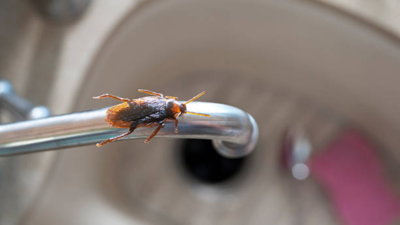
Think cockroaches are just gross? Think again. That creepy crawler skittering across your kitchen floor might be doing more than just raiding your biscuit tin. According to cardiologist Dr.
Deepak Krishnamurthy’s recent viral tweet, cockroach infestations can trigger respiratory symptoms like chest tightness and shortness of breath—and it's time we all paid attention.Yes, you read that right. These unwelcome house guests aren’t just annoying—they’re potentially hazardous to your health.
What’s so dangerous about cockroaches?
Most of us associate cockroaches with dirty kitchens and night-time sneak attacks, but what you might not know is that their body parts, saliva, and even feces are loaded with proteins that can trigger allergic reactions and asthma.
These particles don’t just disappear—they float around in your home’s air, settle in your furniture, and make themselves at home in your lungs. According to the image shared along with Dr. Krishnamurthy’s tweet, cockroach-transmitted illnesses go beyond just triggering allergies. We're talking serious stuff like:
- Asthma – Aggravated by cockroach allergens, leading to wheezing, chest tightness, and difficulty breathing.
- Salmonella – Which can cause gastrointestinal distress and even typhoid fever.
- E. coli – Responsible for severe food poisoning and potentially life-threatening symptoms.
It’s not just fear-mongering. Studies have shown a strong link between cockroach infestations and increased asthma symptoms, especially in kids living in urban environments. One major study from the National Institute of Environmental Health Sciences even found that children allergic to cockroaches were four times more likely to be hospitalized for asthma.
What are the warning signs?
You don’t need to see cockroaches crawling around your kitchen to know they’ve made themselves at home. Sometimes, your body starts dropping hints before you even catch a glimpse of one. If you’ve been running a low-grade fever that just won’t quit, or you’re feeling off with random bouts of nausea and vomiting, your body might be reacting to more than just a bad meal.Add diarrhea to the mix, and it’s easy to blame food poisoning or a stomach bug.
But if it keeps coming back—or doesn’t make sense with what you’ve eaten—there might be something else going on behind the walls or under the sink.Muscle aches and joint pain can also creep in, making you feel like you’ve got the flu, except it never really goes away. And here’s the big one: if your chest feels tight, you’re wheezing, or you’ve developed a persistent cough with shortness of breath, it’s time to pay closer attention.
These are classic signs of an allergic or asthma-like reaction—often triggered by cockroach allergens floating invisibly through the air.So if you’ve ruled out COVID, the flu, or any obvious infections, maybe it’s time to stop reaching for the meds and start looking for the real culprits—those sneaky roaches that could be turning your home into a health hazard.
How are these tiny creatures causing such big problems?
The science is pretty straightforward. Cockroach droppings, shed body parts, and saliva contain potent allergens.
When these tiny particles become airborne, they can enter your respiratory tract. For people with asthma or chronic respiratory issues, this can be dangerous—even life-threatening.But even if you're healthy, constant low-level exposure can still lead to inflammation in the lungs, triggering symptoms that look suspiciously like a chest infection—or worse.And here’s the kicker: cockroaches love hiding in warm, moist, dark places.
Bathrooms, kitchens, under the fridge, behind the cabinets. So even if you keep your home reasonably clean, they could still be creeping around, causing chaos without you knowing.
Start with awareness
If you or a loved one is experiencing unexplained respiratory symptoms, think beyond pollution and pollen. Think pests. Especially if your symptoms get worse at night or after spending time indoors.Here’s what you can do:
- Get a professional pest inspection done—even if you don’t see bugs.
- Clean food crumbs, seal leftovers, and fix water leaks (cockroaches love moisture).
- Use insect traps or natural repellents like bay leaves or boric acid (safely and sparingly).
- Keep your indoor air clean with purifiers—especially HEPA filters that trap allergens.
And most importantly, if your breathing issues persist, talk to a doctor and mention the possibility of allergen exposure from pests.It’s easy to laugh off cockroaches as harmless household pests. But if you're waking up wheezing, coughing, or feeling tightness in your chest, the issue might not be in your lungs—it might be hiding under your sink.As Dr. Krishnamurthy rightly pointed out, the health risks posed by cockroaches are real, and they’re sneaky. So the next time you spot one darting across your floor, don’t just scream—take action. Because protecting your home from bugs might just protect your lungs too.

 7 hours ago
50
7 hours ago
50




























 English (US)
English (US)